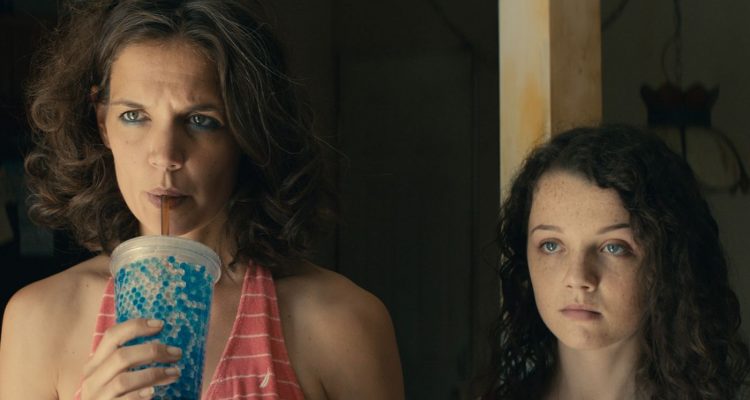There are passion projects, there are vanity projects, and then there are films like Katie Holmes’ directorial debut, “All We Had,” which is neither especially passionate nor especially vain, and is instead entirely offensive. It isn’t consciously offensive, mind you, and it isn’t offensive on social terms, either; it’s offensive purely as narrative, a breach against common decency and originality in storytelling. The French have a phrase for yarns like this: “Nostalgie de la boue,” yearning for the mud, in which the author consciously appropriates the stylings of society’s lower classes just to tickle themselves. It’s a form of self-indulgence and a display of artistic arrogance, and it’s the fuel that drives “All We Had” along for its sluggish hour and forty minute running time.
Not all art is about politics, but all art is political regardless of whether it means to be or not, so maybe Holmes deserves the benefit of the doubt here. Her film is, after all, well-intentioned, in the sense that she warps its structure around a fundamental belief in fairy tale variety goodness; she appears to be assured by the notion that the world is a good place inhabited by generally good people, and that goodness will always find those who are in the most desperate need of it. Such as movies can possess morality, “All We Had” is “good,” but as actual entertainment it’s an absolute drag dressed in the guise of wish fulfillment, where cheesy dialogue swells with obvious metaphor and meaning but very little by way of poetry or authenticity. It’s a movie about a tough life lived on the road that knows nothing of its own background.
“All We Had” is about Rita (Holmes) and her daughter, Ruthie (Stefania LaVie Owen), who we’re introduced to as they haul ass out of Rita’s boyfriend’s place and make tracks for Boston without much more than the gas in their car, the clothes on their backs, and the cash in their pockets. It seems that Rita has historically awful taste in men; her current fella is a loser at best and could possibly be something worse than that. The film doesn’t elaborate on what Rita and Ruthie are fleeing from because it doesn’t have to. (It’s also the first and last time Holmes and screenwriter Josh Boone try being economical with the deployment of backstory.) From there they motor along and run into car trouble, eventually settling in at a small diner run by the benevolent Marty (Richard Kind), where Rita picks up a job as a waitress and the real plot of the film begins unfolding in earnest.
There’s enough saccharine cliché in the film’s set-up to rot one’s teeth, which is probably why Holmes starts things off by having Ruthie help yank a molar out of Rita’s mouth. “All We Had” is the type of picture where rather than call the cops on Rita and Ruthie for trying to dine and dash, Marty offers them work and a place to stay; where Marty’s only employee is a transgender woman named Peter Pam (Eve Lindley), who has a quick wit and big dreams of moving to New York City; where Rita’s major love interest happens to be a dentist (played by Luke Wilson); and so on and so forth past the point where our patience expires. It’s not that the film’s ideas don’t exist in reality. It’s that they don’t typically all exist in reality together, and also that with each banality Holmes piles upon the picture the less palatable it becomes.
To her credit, she cares about Rita and about Ruthie; the film might be little more than a gross act of mimicry, but it is compassionate toward its characters and their ever-increasing collection of plights. But Holmes isn’t accustomed to self-editing: she doesn’t quite know when enough is enough, and thus continues to blend new struggles into the film’s framework without exploring its previously existing struggles thoroughly enough. Is “All We Had” a movie about the American housing crisis? Is it about the peer pressure teens have to reckon with every day that they attend school? Is it about being the new kid on the block in a town where nobody knows who you are? Is it about fighting transphobia? Is it about the crippling effects of alcoholism and abuse? Maybe the answer is “yes,” just yes, to all of these, but the film lacks the depth necessary to balance and address each of these questions with substance, offering us only hokey bromides as resolution.
“When you live this close to the bottom, calling the cops doesn’t do any good,” Owen proclaims in grim voiceover as local hatemongers assault Pam in one of the film’s more shocking scenes. It feels inappropriate to laugh at what we’re seeing, but there’s such tone-deaf, unearned sobriety to Ruthie’s words that laughter is the most appropriate response. Holmes is only able to imagine what the life Ruthie describes actually looks like, and she labors endlessly to smooth out its uglier edges with platitudes, with preciousness, and without an ounce of consideration for what she’s saying by blithely wading into experiences that aren’t hers. The ultimate effect of the film’s hackneyed material is as debilitating as it is frustrating. [D]

